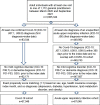Mild Cognitive Disorder in Post-COVID-19 Syndrome: A Retrospective Cohort Study of 67,000 Primary Care Post-COVID Patients
- PMID: 35891640
- PMCID: PMC9277697
- DOI: 10.3233/ADR-220020
Mild Cognitive Disorder in Post-COVID-19 Syndrome: A Retrospective Cohort Study of 67,000 Primary Care Post-COVID Patients
Abstract
Background: Little is known about the impact of COVID-19 on mild cognitive disorder.
Objective: The aim of this retrospective cohort study was to investigate whether COVID-19 diagnosis is associated with subsequent mild cognitive disorder (MCD) compared to acute upper respiratory infections (AURI).
Methods: This retrospective cohort study used data from the Disease Analyzer database (IQVIA) and included 67,046 patients with first-time symptomatic or asymptomatic COVID-19 diagnoses in 1,172 general practices in Germany between March 2020 and September 2021. Diagnoses were based on ICD-10 codes. Patients diagnosed with AURI were matched to 67,046 patients with COVID-19 using propensity scores based on sex, age, index month, and comorbidities. The index date was the diagnosis date for either COVID-19 or AURI. Associations between the COVID-19 and MCD were studied using conditional Poisson regression models.
Results: The incidence of MCD was 7.6 cases per 1,000 person-years in the COVID-19 group and 5.1 cases per 1,000 person-years in the AURI group (IRR = 1.49, 95% CI = 1.22-1.82). The incidence rate ratio decreased strongly with increasing age from 10.08 (95% CI = 4.00-24.42) in the age group≤50 to 1.03 (95% CI = 0.81-1.31) in the age group > 70. In addition, the association between COVID-19 and MCD was significant in women (IRR: 1.70, 95% CI: 1.34-2.16) but not in men (IRR: 1.08, 95% CI: 0.75-1.56).
Conclusion: The incidence of MCD was low but significantly higher in COVID-19 than in AURI patients, especially among younger patients. If a cognitive disorder is suspected, referral to a specialist is recommended.
Keywords: COVID-19 pandemic; Germany; general practices; mild cognitive disorder; post-COVID.
© 2022 – The authors. Published by IOS Press.
Conflict of interest statement
The authors have no conflict of interest to report.
Figures
References
-
- Gupta A, Madhavan MV, Sehgal K, Nair N, Mahajan S, Sehrawat TS, Bikdeli B, Ahluwalia N, Ausiello JC, Wan EY, Freedberg DE, Kirtane AJ, Parikh SA, Maurer MS, Nordvig AS, Accili D, Bathon JM, Mohan S, Bauer KA, Leon MB, Krumholz HM, Uriel N, Mehra MR, Elkind MSV, Stone GW, Schwartz A, Ho DD, Bilezikian JP, Landry DW (2020) Extrapulmonary manifestations of COVID-19. Nat Med 26, 1017–1032. - PMC - PubMed
-
- Konturek PC, Harsch IA, Neurath MF, Zopf Y (2020) COVID-19 - more than respiratory disease: A gastroenterologist’s perspective. J Physiol Pharmacol 71, 179–189. - PubMed
-
- Rogers JP, Chesney E, Oliver D, Pollak TA, McGuire P, Fusar-Poli P, Zandi MS, Lewis G, David AS (2020) Psychiatric and neuropsychiatric presentations associated with severe coronavirus infections: A systematic review and meta-analysis with comparison to the COVID-19 pandemic. Lancet Psychiatry 7, 611–627. - PMC - PubMed
LinkOut - more resources
Full Text Sources



